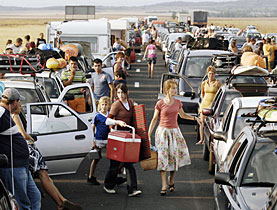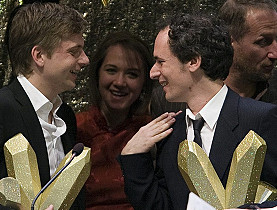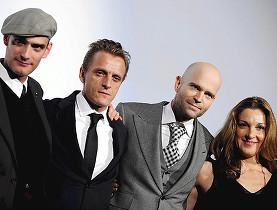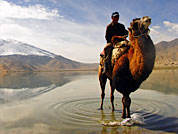A film festival by any other name

Solothurn has been hosting one of the most important events for Swiss films for many years, but until recently it didn't want to be called a festival.
Faced with increasing competition, the loss of the Swiss Film Prize, and criticism over its lack of glamour, it has decided to revamp its programme. It will now host the second-largest award for Swiss films.
“The Solothurn film festival is mainly for Swiss films of all genres, lengths, for documentary, fiction, animation, experimental films and also for music,” Ivo Kummer, the festival’s head, told swissinfo at the media launch ahead of the festival’s start on Monday.
“It’s the oldest at 44 years and after the Locarno film festival it’s the second most important festival for Switzerland.”
New this year at the six-day event in the small northern town is the Prix de Soleure film prize, worth SFr60,000 ($54,000), the second largest prize in monetary terms in Swiss film making.
This will be awarded to films which have “humanism”, says Kummer – in a move designed to make it different to the Swiss Film Prize, Switzerland’s equivalent to the Oscars.
After 11 years the Swiss Film Prize will be moving away from Solothurn and will be hosted in Lucerne at the beginning of March.
There will be more premieres at Solothurn, as well as a retrospective, now called recontre, which is devoted to Swiss-Canadian filmmaker Léa Pool.
These changes could mark a new chapter at the event, says Christian Jungen, film editor at the Mittelland Zeitung newspaper and cinema scholar.
Change of name
“For many years Solothurn didn’t want to be a festival. It was called film days which means it was a showcase for Swiss films which were produced in the 12 months beforehand,” he explained.
It was founded in the late 1960s and early 1970s when Swiss filmmakers found it difficult to get their work shown in cinemas and therefore reach a wider audience.
“Today there isn’t this problem any more so Solothurn has a little bit lost its raison d’être,” Jungen told swissinfo.
“That’s why Ivo Kummer has changed his film days to a festival with awards and retrospectives.”
Solothurn has one-quarter the number of accredited media and one-fifth the number of visitors of its more famous cousin, the Locarno film festival. Locarno takes place in August each year in the sunny climes of southern Switzerland.
But this is not surprising, given that Locarno is an international festival and Solothurn’s reach is more domestic. However, Solothurn still out-trumps newcomers such as the Zurich film festival, which is also international.
Last year Solothurn had 44,000 visitors in six days, whereas Zurich had 27,000 visitors in ten days, according to Jungen.
The Swiss Film Prize’s move to Lucerne comes after pressure to inject more red carpet glamour into the event.
Part of the problem, says Jungen, is that Solothurn’s history as a platform for alternative film simply did not fit in with the “Swiss Oscars”.
Public the star
For Kummer, the public remains the star at Solothurn. “I don’t like the red carpet with no content and I don’t like events with champagne and other things,” he said. “I also don’t think it’s the right time [for glamour at Solothurn] as we are in uncertain times.”
“It’s an opportunity to discuss content, to be honest and also a bit modest and that is also the tradition of our festival – a modest festival with content, commitment and a lot of passion for the job,” he added.
One public discussion will involve interior minister Pascal Couchepin, whose remit includes culture, and Viviane Redding, European Union commissioner for information society and media.
However, Solothurn will remain the place where the nominations for the Swiss Film Prize will be announced by the newly formed Swiss Film Academy.
The academy, based on the United States’ Academy of Motion Picture Arts and Sciences, which make the Oscar nominations, was formed last year and has more than 250 members, including directors, producers and actors.
Nominations for the Swiss Film Prize used to be made by the Federal Culture Office, but it came under fire after it failed to include popular films such as Late Bloomers, a comedy about the opening of a lingerie shop in a small village, on its short list.
The lack of the Swiss Film Prize need not be a blow for Solothurn, says Jungen.
“I see it as a big chance for Solothurn to relaunch the film days with new ideas, with an alternative programme, saying that it is for the whole film production not just for certain film production. I’m very curious to see how it will be this year.”
swissinfo, Isobel Leybold-Johnson
The festival takes place from January 19-25 in Solothurn.
The programme is split into three parts: Swiss Forum: a representative selection of current Swiss films; Rencontre: a retrospective devoted to a key contributor to Swiss filmmaking and Invitation, a selection of films produced in countries bordering Switzerland.
The cinematic programme is accompanied by numerous additional events, roundtable talks and discussions, all of which deal with Swiss film productions and Swiss film policy.
288 films will be shown.
Prix de Soleure (SFr60,000): for a feature-length fiction or documentary film. This Jury Prize is awarded to a film with a distinctive humanistic message. The jury this year includes former cabinet minister Ruth Dreifuss.
Prix du Public: will be awarded for a second time in 2009. Ten films are nominated for this prize and the audience votes on its favourite film.
There is also a Prix Pathé awarded to a film critic.

In compliance with the JTI standards
More: SWI swissinfo.ch certified by the Journalism Trust Initiative





You can find an overview of ongoing debates with our journalists here. Please join us!
If you want to start a conversation about a topic raised in this article or want to report factual errors, email us at english@swissinfo.ch.